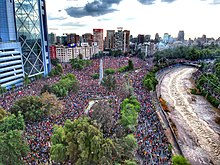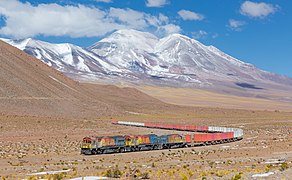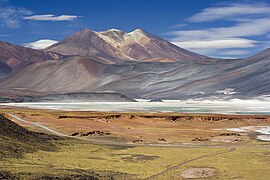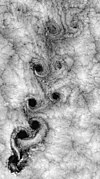Portal:Chile
| Main page | Assessment | Articles | Templates | Translation | Noticeboard | To Do List | Portal |
The Chile Portal

Chile, officially the Republic of Chile, is a country in western South America. It is the southernmost country in the world and the closest to Antarctica, stretching along a narrow strip of land between the Andes Mountains and the Pacific Ocean. Chile had a population of 17.5 million as of the latest census in 2017 and has a territorial area of 756,102 square kilometers (291,933 sq mi), sharing borders with Peru to the north, Bolivia to the northeast, Argentina to the east, and the Drake Passage to the south. The country also controls several Pacific islands, including Juan Fernández, Isla Salas y Gómez, Desventuradas, and Easter Island, and claims about 1,250,000 square kilometers (480,000 sq mi) of Antarctica as the Chilean Antarctic Territory. The capital and largest city of Chile is Santiago, and the national language is Spanish.
Spain conquered and colonized the region in the mid-16th century, replacing Inca rule, but failed to conquer the independent Mapuche people who inhabited what is now south-central Chile. Chile emerged as a relatively stable authoritarian republic in the 1830s after their 1818 declaration of independence from Spain. During the 19th century, Chile experienced significant economic and territorial growth, putting an end to Mapuche resistance in the 1880s and gaining its current northern territory in the War of the Pacific (1879–83) by defeating Peru and Bolivia. In the 20th century, up until the 1970s, Chile underwent a process of democratization and experienced rapid population growth and urbanization, while relying increasingly on exports from copper mining to support its economy. During the 1960s and 1970s, the country was marked by severe left-right political polarization and turmoil, which culminated in the 1973 Chilean coup d'état that overthrew Salvador Allende's democratically elected left-wing government. This was followed by a 16-year right-wing military dictatorship under Augusto Pinochet, which resulted in more than 3,000 deaths or disappearances. The regime ended in 1990, following a referendum in 1988, and was succeeded by a center-left coalition, which ruled until 2010.
Chile has a high-income economy and is one of the most economically and socially stable nations in South America, leading Latin America in competitiveness, per capita income, globalization, peace, and economic freedom. Chile also performs well in the region in terms of sustainability of the state and democratic development, and boasts the second lowest homicide rate in the Americas, following only Canada. Chile is a founding member of the United Nations, the Community of Latin American and Caribbean States (CELAC), and the Pacific Alliance, and joined the OECD in 2010. (Full article...)

José María Caro Martínez[a] (Spanish pronunciation: [xoˈse maˈɾia ˈkaɾo maɾˈtineθ] ; 1830 – 11 November 1916) was a Chilean politician and civil servant. In May 1894, he was unanimously elected as the first mayor of the commune of Pichilemu, with Pedro Nolasco de Mira and Francisco Reyes made second and third magistrate respectively. Caro Martínez had previously served for several years as administrator or llavero of the San Antonio de Petrel hacienda and, between 1891 and 1892, was the Subdelegate of the 13th Subdelegation of San Fernando Department which comprised the district of Cáhuil.
The eleven-year mayorship of Caro Martínez, which lasted from 1894 and 1905, was described by journalist and local historian José Arraño Acevedo as "the most fruitful" in the history of the commune. In his four terms, Caro Martínez built roads connecting Pichilemu and San Fernando, capital of the department of the same name, and founded several schools in Pichilemu and parts of current Marchigüe. (Full article...)Selected biography -
Salvador Guillermo Allende Gossens (26 June 1908 – 11 September 1973) was a Chilean socialist politician who served as the 28th president of Chile from 1970 until his death in 1973. As a democratic socialist committed to democracy, he has been described as the first Marxist to be elected president in a liberal democracy in Latin America.
Allende's involvement in Chilean politics spanned a period of nearly forty years, during which he held various positions including senator, deputy, and cabinet minister. As a life-long committed member of the Socialist Party of Chile, whose foundation he had actively contributed to, he unsuccessfully ran for the national presidency in the 1952, 1958, and 1964 elections. In 1970, he won the presidency as the candidate of the Popular Unity coalition in a close three-way race. He was elected in a run-off by Congress, as no candidate had gained a majority. In office, Allende pursued a policy he called "The Chilean Way to Socialism". The coalition government was far from unanimous. Allende said that he was committed to democracy and represented the more moderate faction of the Socialist Party, while the radical wing sought a more radical course. Instead, the Communist Party of Chile favored a gradual and cautious approach that sought cooperation with Christian democrats, which proved influential for the Italian Communist Party and the Historic Compromise. (Full article...)Selected article -

A series of massive demonstrations and severe riots, known in Chile as the Estallido Social (lit. social outburst), originated in Santiago and took place in all regions of Chile, with a greater impact in the regional capitals. The protests mainly occurred between October 2019 and March 2020, in response to a raise in the Santiago Metro's subway fare, a probity crisis, cost of living, university graduate unemployment, privatisation, and inequality prevalent in the country.
The protests began in Chile's capital, Santiago, as a coordinated fare evasion campaign by secondary school students which led to spontaneous takeovers of the city's main train stations and open confrontations with the Carabineros de Chile (the national police force). On 18 October, the situation escalated as a group of people began vandalizing Santiago's infrastructure; seizing, vandalizing, and burning down many stations of the Santiago Metro network and disabling them with extensive infrastructure damage; and for a time causing the closure of the network in its entirety. Eighty-one stations sustained major damage, including seventeen burned down. On the same day, President of Chile Sebastián Piñera announced a state of emergency, authorizing the deployment of Chilean Army forces across the main regions to enforce order and prevent the destruction of public property, and invoked before the courts the Ley de Seguridad del Estado ("State Security Law") against dozens of detainees. A curfew was declared on 19 October in the Greater Santiago area. (Full article...)General images
Did you know (auto generated)

- ... that Earle M. Chiles, a businessman and philanthropist from Portland, Oregon, was also a senator of the board of Ludwig Maximilian University in Munich, Germany?
- ... that the Chile Ridge has a slab window?
- ... that the Peruvian Civil Guard officer Mariano Santos Mateo was nicknamed the Brave Man of Tarapacá because he captured a banner of a Chilean military unit during the Battle of Tarapacá?
- ... that Peruvian foreign minister Manuel María Gálvez Egúsquiza was arrested by Chilean troops for refusing to sign peace with the cession of territory during the War of the Pacific?
- ... that Angelito de Canal 13, the mascot of the Chilean television network Canal 13, was inspired by its creator's son?
- ... that Salar de Pajonales in Chile has been used as an analogue for environments on Mars?
Topics
Categories
Recognized content
| This is a list of recognized content, updated weekly by JL-Bot (talk · contribs) (typically on Saturdays). There is no need to edit the list yourself. If an article is missing from the list, make sure it is tagged (e.g. {{WikiProject Chile}}) or categorized correctly and wait for the next update. See WP:RECOG for configuration options. |
Featured articles
- Chilean battleship Almirante Latorre
- Almirante Latorre-class battleship
- Cerro Azul (Chile volcano)
- Calabozos
- El Tatio
- Chilean cruiser Esmeralda (1883)
- Guallatiri
- Mount Hudson
- Laguna del Maule (volcano)
- Mothers of the Disappeared
- Ojos del Salado
- Pali-Aike volcanic field
- Pisco sour
- South American dreadnought race
- Taapaca
Good articles
- 2010 Pichilemu earthquakes
- 2018 Santiago ePrix
- Agustín Ross Cultural Centre
- Angata
- Los Ángeles Negros
- Apacheta-Aguilucho volcanic complex
- Argentine–Chilean naval arms race
- Atamu Tekena
- Orlando Bosch
- Lorenza Böttner
- Sara Braun
- Monte Burney
- Battle of Caldera Bay
- Felipe Camiroaga
- Chilean battleship Capitán Prat
- Carménère
- José María Caro Martínez
- Chile at the 2014 Winter Paralympics
- Coat of arms of Pichilemu
- Dutch expedition to Valdivia
- El Laco
- Milton Friedman
- Fueguino
- Irruputuncu
- Laguna Miscanti
- Laguna del Negro Francisco
- Lascar (volcano)
- Lastarria
- Lazufre
- Licancabur
- Licancabur Lake
- Llullaillaco
- Nevado de Longaví
- Manuel Foster Observatory
- Monturaqui
- Irene Morales
- John Thomas North
- Obligation to Negotiate Access to the Pacific Ocean
- Olca-Paruma
- USS Oneota (1864)
- La Pacana
- Parinacota (volcano)
- Patio 29
- Pichilemu
- Colegio de la Preciosa Sangre de Pichilemu
- Salar de Punta Negra
- Reclus (volcano)
- Murders of María José Reyes and Juan Duarte
- Sammis Reyes
- Riro Kāinga
- Sairecabur
- Salar Ignorado
- San Pedro (Chile volcano)
- Socompa
- Sollipulli
- Tacora
- Tilocálar
- Nevado Tres Cruces
- Tupungatito
- Tuyajto Lake
Featured pictures
-
360-degree Panorama of the Southern Sky edit
-
A 360 degree panorama of a unique cloudscape over La Silla
-
Culpeo MC
-
FCAB EMD GT22CU-3 San Pedro - Ascotan
-
Laguna Miñiques, Chile, 2016-02-08, DD 33-38 PAN
-
Laser Towards Milky Ways Centre
-
Miscanti Lagoon near San Pedro de Atacama Chile Luca Galuzzi 2006
-
Moai Rano raraku
-
SQM GE 289A Boxcab Carmelita - Reverso
-
Volcán San Pedro, Chile, 2016-02-09, DD 18
-
Vortex-street-1
WikiProjects
Related portals
New articles
Rules | Match log | Results page (for watching) | Last updated: 2024-05-29 20:10 (UTC)
Note: The list display can now be customized by each user. See List display personalization for details.
- British Empire (horse) (edit | talk | history | links | watch | logs | tools) by TabbyLadrona (talk · contribs · new pages (15)) started on 2024-05-29, score: 14
- Aristocratic Republic (Peru) (edit | talk | history | links | watch | logs | tools) by AlejandroFC (talk · contribs · new pages (27)) started on 2024-05-29, score: 14
- National Reconstruction (Peru) (edit | talk | history | links | watch | logs | tools) by AlejandroFC (talk · contribs · new pages (27)) started on 2024-05-29, score: 14
- SPECULOOS-3 b (edit | talk | history | links | watch | logs | tools) by InTheAstronomy32 (talk · contribs · new pages (14)) started on 2024-05-26, score: 16
- FloyyMenor (edit | talk | history | links | watch | logs | tools) by Floppykart (talk · contribs · new pages (33)) started on 2024-05-28, score: 31
- IFCPF Americas Championships (edit | talk | history | links | watch | logs | tools) by Teterev53 (talk · contribs · new pages (97)) started on 2024-05-28, score: 14
- Eduardo Contreras Mella (edit | talk | history | links | watch | logs | tools) by Jmanlucas (talk · contribs · new pages (34)) started on 2024-05-28, score: 28
- Praocis (edit | talk | history | links | watch | logs | tools) by Flora and fauna man (talk · contribs · new pages (1)) started on 2024-05-28, score: 16
- History of Peru (1821–1842) (edit | talk | history | links | watch | logs | tools) by AlejandroFC (talk · contribs · new pages (27)) started on 2024-05-28, score: 20
- Louise Dewaet (edit | talk | history | links | watch | logs | tools) by Lachie23 (talk · contribs · new pages (8)) started on 2024-05-28, score: 20
- Jewish Archive of Chile (edit | talk | history | links | watch | logs | tools) by Igallards7 (talk · contribs · new pages (3)) started on 2024-05-27, score: 43
- Zoe Díaz (edit | talk | history | links | watch | logs | tools) by Lachie23 (talk · contribs · new pages (8)) started on 2024-05-27, score: 20
- Miss Cosmo International 2024 (edit | talk | history | links | watch | logs | tools) by KamyyFallon (talk · contribs · new pages (1)) started on 2024-05-25, score: 16
- Idea-Tec (edit | talk | history | links | watch | logs | tools) by Celinea33 (talk · contribs · new pages (1)) started on 2024-05-25, score: 31
- Alto Río building collapse (edit | talk | history | links | watch | logs | tools) by Toledo1970 (talk · contribs · new pages (2)) started on 2024-05-24, score: 28
- Job Bogmis (edit | talk | history | links | watch | logs | tools) by Das osmnezz (talk · contribs · new pages (67)) started on 2024-05-24, score: 35
- List of country subdivision flags in South America (edit | talk | history | links | watch | logs | tools) by For the nth time (talk · contribs · new pages (4)) started on 2024-05-23, score: 30
- 2019 WRC2 Championship (edit | talk | history | links | watch | logs | tools) by Rally Wonk (talk · contribs · new pages (38)) started on 2024-05-24, score: 14
- Sergio Hernán Pérez de Arce Arraigada (edit | talk | history | links | watch | logs | tools) by Ababil0811 (talk · contribs · new pages (3)) started on 2024-05-24, score: 18
- Simon of the Mountain (edit | talk | history | links | watch | logs | tools) by Οἶδα (talk · contribs · new pages (51)) started on 2024-05-24, score: 31
- Baile Funk Experience (edit | talk | history | links | watch | logs | tools) by Hyck (talk · contribs · new pages (2)) started on 2024-05-23, score: 14
- Catholic Church sexual abuse cases in Venezuela (edit | talk | history | links | watch | logs | tools) by Borboteo (talk · contribs · new pages (14)) started on 2024-05-23, score: 16
- Sixties Song (edit | talk | history | links | watch | logs | tools) by TabbyLadrona (talk · contribs · new pages (15)) started on 2024-05-22, score: 20
- David Pérez (footballer) (edit | talk | history | links | watch | logs | tools) by Das osmnezz (talk · contribs · new pages (67)) started on 2024-05-22, score: 15
- Lara Casas (edit | talk | history | links | watch | logs | tools) by Lachie23 (talk · contribs · new pages (8)) started on 2024-05-22, score: 20
- Leonora Vicuña (edit | talk | history | links | watch | logs | tools) by Nick Number (talk · contribs · new pages (21)) started on 2024-05-21, score: 63
- Matías Carrera (edit | talk | history | links | watch | logs | tools) by ImSnot (talk · contribs · new pages (2)) started on 2024-05-21, score: 23
- Atacamallium (edit | talk | history | links | watch | logs | tools) by Tom Radulovich (talk · contribs · new pages (81)) started on 2024-05-21, score: 67
- Teresa Lima (edit | talk | history | links | watch | logs | tools) by Lachie23 (talk · contribs · new pages (8)) started on 2024-05-21, score: 14
- Negationism of the military dictatorship of Chile (edit | talk | history | links | watch | logs | tools) by Borboteo (talk · contribs · new pages (14)) started on 2024-05-20, score: 43
- Dublin Declaration on Maternal Healthcare (edit | talk | history | links | watch | logs | tools) by Wikisaurus (talk · contribs · new pages (1)) started on 2024-05-20, score: 16
- Action of Rights Protection (Chile) (edit | talk | history | links | watch | logs | tools) by Xarucoponce (talk · contribs · new pages (1)) started on 2024-05-20, score: 53
- List of Academy Award–nominated films (edit | talk | history | links | watch | logs | tools) by Ostcgl (talk · contribs · new pages (1)) started on 2024-05-20, score: 16
- Patagona (edit | talk | history | links | watch | logs | tools) by UtherSRG (talk · contribs · new pages (48)) started on 2024-05-20, score: 16
- La Más Draga: Solo Las Más (edit | talk | history | links | watch | logs | tools) by Dominikcapuan (talk · contribs · new pages (1)) started on 2024-05-19, score: 14
- Gamochaeta alpina (edit | talk | history | links | watch | logs | tools) by Peter coxhead (talk · contribs · new pages (40)) started on 2024-05-19, score: 31
- Johannes Nuñez (edit | talk | history | links | watch | logs | tools) by ImSnot (talk · contribs · new pages (2)) started on 2024-05-18, score: 23
- Eunice pennata (edit | talk | history | links | watch | logs | tools) by PigeonJesus (talk · contribs · new pages (4)) started on 2024-05-18, score: 16
- History of Bologna FC 1909 (edit | talk | history | links | watch | logs | tools) by Manoru007 (talk · contribs · new pages (8)) started on 2024-05-17, score: 14
- The Idol (1952 film) (edit | talk | history | links | watch | logs | tools) by Lord Cornwallis (talk · contribs · new pages (54)) started on 2024-05-17, score: 43
- Confession at Dawn (edit | talk | history | links | watch | logs | tools) by Lord Cornwallis (talk · contribs · new pages (54)) started on 2024-05-17, score: 31
- Meganoticias (edit | talk | history | links | watch | logs | tools) by FrederickEvans (talk · contribs · new pages (26)) started on 2024-05-17, score: 43
- La torre de Mabel (edit | talk | history | links | watch | logs | tools) by FrederickEvans (talk · contribs · new pages (26)) started on 2024-05-17, score: 43
- Historic Centre of Cuzco (edit | talk | history | links | watch | logs | tools) by AlejandroFC (talk · contribs · new pages (27)) started on 2024-05-16, score: 14
- Montserrat Palmer (edit | talk | history | links | watch | logs | tools) by TomasVial (talk · contribs · new pages (1)) started on 2024-05-16, score: 49
- Marti Group (edit | talk | history | links | watch | logs | tools) by Fejesjoco (talk · contribs · new pages (1)) started on 2024-05-15, score: 16
- The Gelboys (edit | talk | history | links | watch | logs | tools) by Karich28 (talk · contribs · new pages (6)) started on 2024-05-15, score: 24
- Caroline Dawson (writer) (edit | talk | history | links | watch | logs | tools) by Bearcat (talk · contribs · new pages (124)) started on 2024-05-15, score: 35
- List of international trips made by Winston Peters as Foreign Minister (edit | talk | history | links | watch | logs | tools) by DougDommadome (talk · contribs · new pages (0)) started on 2024-05-04, score: 14
Associated Wikimedia
The following Wikimedia Foundation sister projects provide more on this subject:
-
Commons
Free media repository -
Wikibooks
Free textbooks and manuals -
Wikidata
Free knowledge base -
Wikinews
Free-content news -
Wikiquote
Collection of quotations -
Wikisource
Free-content library -
Wikiversity
Free learning tools -
Wikivoyage
Free travel guide -
Wiktionary
Dictionary and thesaurus
Purge server cache
Cite error: There are <ref group=lower-alpha> tags or {{efn}} templates on this page, but the references will not show without a {{reflist|group=lower-alpha}} template or {{notelist}} template (see the help page).






















































